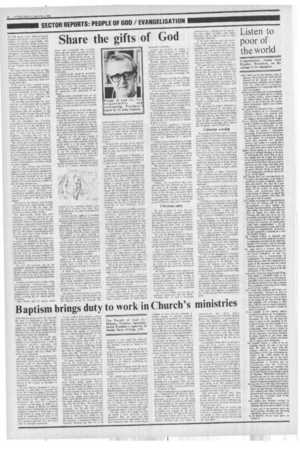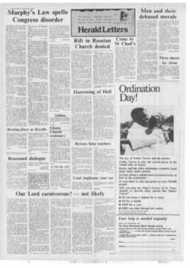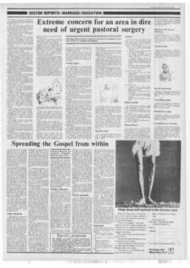Page 6, 9th May 1980
Page 6

Report an error
Noticed an error on this page?If you've noticed an error in this article please click here to report it.
Tags
Share
Related articles
Ministry And Ordination
The Many Different Paths Open To Lay Ministers
Instruction On Lay Ministry Both Saddens And Angers
'who Would True Service See?'
Yes, Minister, A Revolution In Lay Language
Baptism brings duty to work in Church's ministries
OUR Baptism gives us both the right and the duty to participate in the various ministries of the Church. We recognise the unique role of ordained ministers with regard to sacrament and word, but we believe that all other responsibilities should be shared fully with all the people of God, and shared rather than delegated. In following Christ who is our way,. priests and laity need to realise their ministry in an evangelical way — a life of simplicity, poverty, Openness and availability to all men and women in imitation of Christ, the suffering servant. "Cry the Gospel with your whole life" (Charles de Foucauld).
Rooted in Christ, we are sel free to live and work together in a loving, confident partnership which excludes all elements of mistrust, fear or discrimination. We become liberated, willing to take risks and to innovate, daring all things for Christ. With such an openness of heart and mind we become members of a Church on the move, a Church living and growing, serving sensitively and wholeheartedly the world of our own time, a Church giving unequivocal witness to the Gospel, as envisaged by Vatican II.
We have had an experience of such a Church in action here in Liverpool this week. But is this the image of the Church we have seen as we took stock of ourselves during these days of the Pastoral Congress? The answer is 'No'. Each one of us recognises the need for a personal conversion of the heart, so radical as to require a change of lifestyle, of attitudes and structures. Celebrating the Eucharist together in memory of Christ (and as He commanded) we came each day to our work of examining those areas of the Church's life assigned to us, with humility, with openness and with love. And this is what we find and recommend. To be a father of his people a bishop should be able to communicate easily with them all, priests and laity, as preacher of the Gospel and as teacher, particularly of all that Vatican ll recommends, translated into the context of England and of Wales. To achieve this quality of relationship between a bishop and his people we must have many smaller dioceses. In communicating with his people each bishop should inform them fully of his dialogue with Rome, and in a similar manner the Conference of Bishops should so inform the nation's Catholics. We would also wish to suggest to bishops and to priests that they consider carefully the length of time they can best serve a diocese or a parish, as bishop or as parish priest.
The priest should be free to pray, to celebrate the sacraments well and to preach. Mindful of the spiritual needs of his parishioners he should foster the development of prayer groups and house Masses in his parish, both of which enable priest and people to listen and to talk to each other.
We see it as a top priority that every priest should accept 'regular inservice training and spiritual renewal as a normal part of his priestly life. So highly do we rate this need that it leads most of us to accept that some parishes might even be deprived of Sunday Mass at these times. Where teams of lay people, sisters. deacons and priests could operate more effectively than one priest working alone in a parish, we urge that this be done. The inestimable value of celibacy was unanimously accepted, but we ask that careful consideration be given to the question whether it be God's will that married men should at this time be called to the priesthood. A more detailed exploration of the possibility of admitting women to the ordained ministries was also felt to be necessary. It was urged that particular attention be given to fostering the personal and spiritual maturity of those to be ordained.
In considering the diaconate vse felt the need for the Church in England and in Wales to be led to a clearer understanding of this ministry and to the way in which it operates in our countries. Lay ministries should not be stifled in establishing the ministry of deacons.
In general the delegates were looking for more positive encouragement and energetic leadership from bishops and from priests.
Our countries arc now seen as mission territories. The Church has to commit itself to this mission and the laity should be fully involved in it. As the lay role is specifically in the world, it has a distinctiveness of its own guaranteed by baptism, not delegated. Bishops and priests are asked to place more trust in lay initiatives. Ordained ministers should see themselves as servants of the lay service of the world. It was felt that too many clergy use authority not as a service but to contain lay initiative. Free and confident communication and trust between all ministries is needed but, sadly, is frequently absent in the Church's life.
The laity freely acknowledge that they are failing in their specifically secular apostolate. They are aware that their initiatives do not need organisation but that their formation does. The present means available to them are not sufficient. A positive change of priorities involving considerations of personnel and of finance are urgently required to provide permanent and structured means of lay formation at every level and for all age groups, but particularly for youth and recent school leavers. The laity do not fear the challenges of the apostolate, but they need formation, and they need to be trusted. Suggestions for lay formation gave a high priority to programmes of spiritual renewal and to practical retraining appropriate to a rapidly changing society. Greater use should be made of the adult education system, diocesan centres and study groups in the process of shared learning and exploration.
To provide a better service for the Church's mission it was recommended that at parish level "Care Councils" be established which could concentrate on the identification of needs, service giving and social activities, as for example the support of minorities, ethnic groups. the unemployed and the disabled. There was strong support for an ecumenical approach in meeting social needs. Such services should not be confined within administrative boundaries. They are the living expression of Christ's love, operating through the worship, teaching and service of the people of God.
When the delegates were considering the role of Religious they felt that the values inherent in religious life should be more effectively communicated to the local Church. Methods of achieving this should be urgently explored. The spiritual riches of the contemplative orders and their capacity to give and to receive needed to be recognised and engaged by the whole Church. The value of religious life should be affirmed by bishops and in the ordinary course of preaching and teaching in the Church. Bishops are also asked to implement the Holy Sec's recommendations in the directive Mutuae Relationes concerning the appointment of Vicars for Religious, who should be supported by female and male consultors. Religious themselves should share their life more fully with lay people. Superiors of orders of women and of men are asked to examine the specific ways they could contribute their expertise and skills to the continuing formation of the laity for all forms of ministry.
Consideration of the role of women gave cause for much unease. There is so manifestly an imbalance in favour of men that they are often unable to utilise their particular skills in the service of the Church and the wider world. If everyone is to play his or her full part in the ministry of the people of God to all the world some definite changes in attitudes and structures are needed. We hope that nationally and at diocesan level women and men will be involved together in planning and decision making. At parish level priests, religious. lay women and lay men should form teams, working together to meet the needs of the local Church. The request for women's admission to the permanent diaconate was again firmly made. The question of the eventual ordination of women was raised in this context, with a plea that the matter be explored seriously at this time.
The delegates noted sadly that immigrants and coloured people were almost entirely unrepresented in their Sector, and felt this to be a reflection on their own lack of involvement with the total Church in their areas.
Throughout the days of prayer and reflection the delegates were motivated by a desire to realise their responsibilities as the people of God, and to exercise the variety of gifts which are given by one and the same Spirit.
blog comments powered by Disqus













